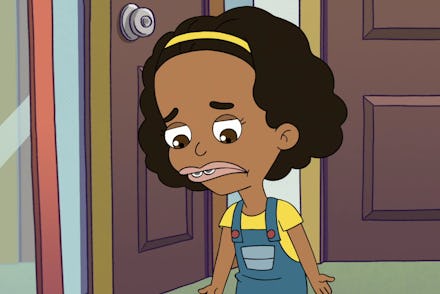The cartoons begin a messy, complicated reckoning with race

As recent sitcoms scrub blackface episodes from the internet, animated series have begun to reckon with some misguided casting choices. First, Jenny Slate announced on Instagram that she would no longer voice Missy, a biracial character on Big Mouth. Later on Wednesday evening, “I Take Responsibility” alum Kristen Bell stepped away from the new Apple TV series Central Park, on which she also voices a mixed race character.
Slate explained her rationale for taking the part in the first place, since her character’s mother is Jewish and white, like Slate. “I acknowledge how my original reasoning was flawed, that it existed as an example of white privilege and unjust allowances made within a system of white supremacy, and that in me playing ‘Missy,’ I was engaging in an erasure of Black people.” She pledges to take accountability for mistakes in the past, and “continue to engage in meaningful anti-racist action.”
Bell echoed many of these sentiments, stating that her taking the part “undermines the specificity of the mixed race & Black American experience.” Bell continues: “I am happy to relinquish this role to someone who can give a much more accurate portrayal and I will commit to learning, growing and doing my part for equality and inclusion.”
Animated series have long been struggling with the issue of white actors portraying characters of a different racial or ethnic background. Earlier this year, Hank Azaria committed to step away from voicing the character of Apu, who’s faced mounting criticism in recent years as a racist stereotype. Bojack Horseman creator Raphael Bob-Waksberg has openly struggled with casting Alison Brie as the show’s Diane Nguyen, a Vietnamese-American woman. As the show progressed, he grappled with this decision in interviews and ceded that he wouldn’t have cast Brie if he had another go at it. Bojack Horseman’s Diane, along with Slate and Bell’s roles, are decidedly different from a character like Apu, but all are subject to new evaluations.
But is this the right course-correction, or does it even create murkier waters for how race is perceived in animation? Aside from the timing, as it rides the crest of sweeping changes and reexaminations of old works, Bell and Slate’s departures might not imply what they think about racialized voice acting. As writers smarter than me have pointed out on Twitter, exactly what message is this sending about the sort of voice that the industry is coding as Black? Did Kristen Bell see and understand Sorry to Bother You?
The writer Lauren Michele Jackson cited The Boondocks as an example of animation collapsing these preconceptions, and wondering what precedent these resignations set. “American animation has always been such neat, weird place for vocal play and inversion even at its most racist, and it's a little disappointing but not surprising that the immediate liberal response is reify race,” she wrote.
Slate wrote in her Instagram post that “Black voices must be heard,” without clarifying if that relates more to timbre or the experience of a show’s creators and writers room. It’s a messy, complex conversation that in many cases is a red herring for the stickier issue of diversifying the entire team behind the series, especially in animation, a notoriously white arm of television. Much like removing recent episodes featuring blackface, this could either be the first step in a promising new direction or just a wholly cosmetic fix for an industry plagued by systemically racist power structures.